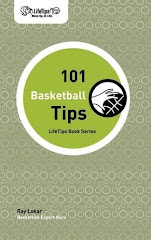In keeping with the Spirit of Christmas I thought I`d leave you with a little song, sung to the tune of "The Twelve Days of Christmas"
*******The Twelve Weeks of Basketball*******
On the first day of practice my team promised me a Big, Golden Championship Ring
In the second week of the season my team promised me 2 Made Free Throws, and a Big, Golden Championship RingIn the third week of the season my team promised me 3 Point Plays, 2 Made Free Throws, and a Big, Golden Championship Ring
In the fourth week of the season my team promised me 4 quarters played , 3 Point Plays, 2 Made Free Throws, and a Big, Golden Championship Ring
In the fifth week of the season my team promised me 5 GREAT PLAYERS, 4 quarters played , 3 Point Plays, 2 Made Free Throws, and a Big, Golden Championship Ring
In the sixth week of the season my team promised me 6 Deadly Shooters, 5 GREAT PLAYERS, 4 quarters played , 3 Point Plays, 2 Made Free Throws, and a Big, Golden Championship Ring
In the seventh week of the season my team promised me 7 Guards a dribbling, 6 Deadly Shooters, 5 GREAT PLAYERS, 4 quarters played , 3 Point Plays, 2 Made Free Throws, and a Big, Golden Championship Ring
In the eighth week of the season my team promised me 8 Forwards Leaping, 7 Guards a dribbling, 6 Deadly Shooters, 5 GREAT PLAYERS, 4 quarters played , 3 Point Plays, 2 Made Free Throws, and a Big, Golden Championship Ring
In the ninth week of the season my team promised me 9 Solid Passers, 8 Forwards Leaping, 7 Guards a dribbling, 6 Deadly Shooters, 5 GREAT PLAYERS, 4 quarters played , 3 Point Plays, 2 Made Free Throws, and a Big, Golden Championship Ring
In the tenth week of the season my team promised me 10 Guys Competing, 9 Solid Passers, 8 Forwards Leaping, 7 Guards a dribbling, 6 Deadly Shooters, 5 GREAT PLAYERS, 4 quarters played , 3 Point Plays, 2 Made Free Throws, and a Big, Golden Championship Ring
In the eleventh week of the season my team promised me11 Tough Rebounders, 10 Guys Competing, 9 Solid Passers, 8 Forwards Leaping, 7 Guards a dribbling, 6 Deadly Shooters, 5 GREAT PLAYERS, 4 quarters played , 3 Point Plays, 2 Made Free Throws, and a Big, Golden Championship Ring
In the twelth week of the season my team promised me 12 Strong Defenders, 11 Tough Rebounders, 10 Guys Competing, 9 Solid Passers, 8 Forwards Leaping, 7 Guards a Dribbling, 6 Deadly Shooters, 5 GREAT PLAYERS, 4 Quarters Played , 3 Point Plays, 2 Made Free Throws, and a Big, Golden Championship Ring!
Merry Christmas and Happy Holidays!









